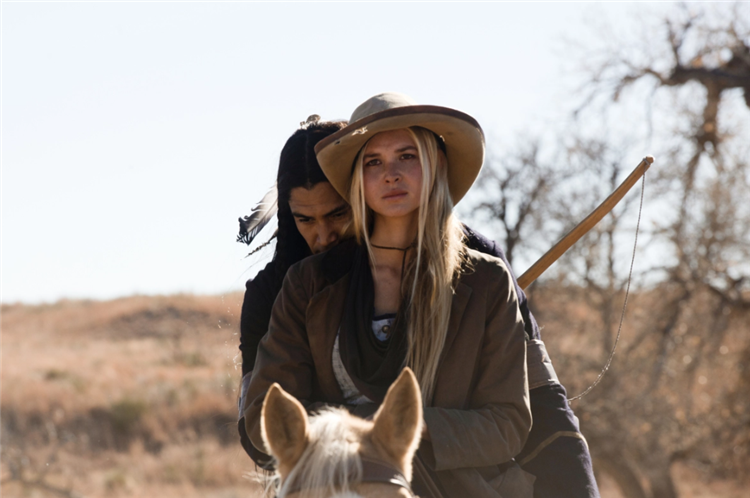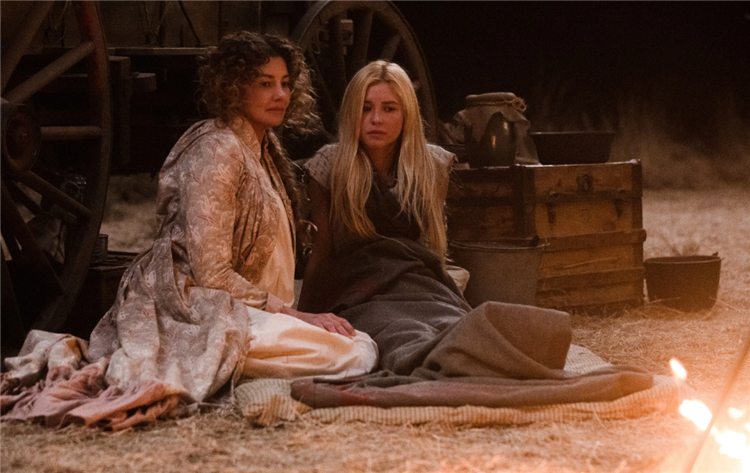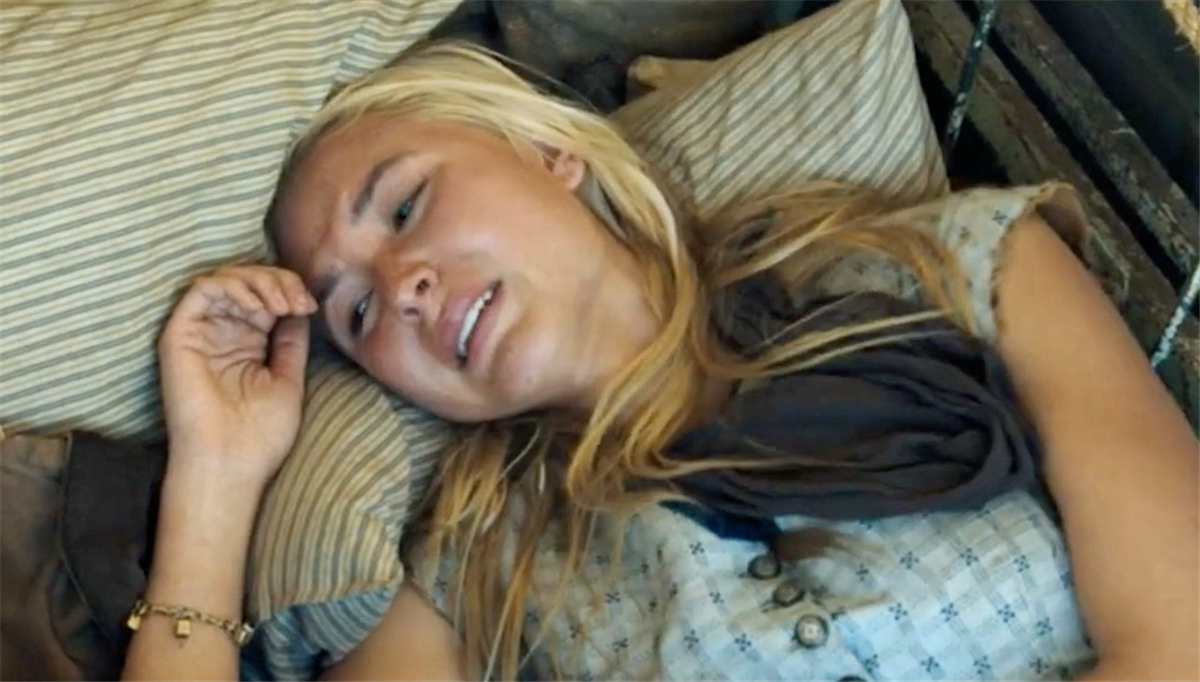Isabel May captured audience hearts as Elsa Dutton on 1883. But when the actress reflects on her breakout role in the Yellowstone prequel series, she’s humble.
“It didn’t feel like an explosion for me, at least,” she tells The Hollywood Reporter. “I don’t really participate in social media. But I think what’s telling is when you are at a grocery store and you bump into someone and they look at your face, and you know they recognize you, and then their eyes fill up with tears. I don’t get recognized very often but when I do it’s that; it’s very emotional.”
The Paramount+ Western series, set in the year 1883, starred and featured May as narrator of the saga that would follow a new Dutton family, the elders to John Dutton (Kevin Costner) of the flagship series Yellowstone. Taylor Sheridan, creator of the Yellowstone-verse and expanding Sheridan-verse, was inspired to center the prequel around May after seeing her audition for another one of his shows, Mayor of Kingstown.
“I think some things are just meant to be, and I was just at the right place at the right time; and the right person,” she says.
The opening of 1883 set the tone for what would lie ahead in the series, as the Dutton family embarks on a treacherous journey west through the Great Plains in seek of a better future (one that would ultimately lead them to what becomes the Yellowstone ranch of the flagship series). 1883 opens with Elsa in a perilous place as she narrates: “It is hell, and there are demons everywhere. But if this is hell and I’m in it, then I must be a demon too and I’m already dead.”
In late 2021 and early 2022, viewers tuned in weekly to see how Elsa and her Dutton family’s saga would end. Now, with Paramount Network’s linear rerelease of the hit series (the first two episodes air June 18, followed by new episodes on Sundays), May speaks with THR below about reintroducing her beloved Elsa to an even wider audience: “I love that character so much. She kind of makes me weepy as well. When you get to play a person that you’d like to be and that exemplifies grace and passion and bravery, you want that kind of character to reach peoples’ hearts. I’m thrilled that it may be reintroduced to people who have yet to experience her and that story.”
I loved reading about your audition story; how you went out for Mayor of Kingstown and Taylor Sheridan called you two weeks later to tell you he wrote this show around you instead. Did you know Elsa’s full arc when you signed on?
I didn’t know her full arc. I had an idea. There was an outline. But he hadn’t written it yet. So as he was writing it, he would finish a draft and just send it, which was an odd but incredible experience and something I savored. Just to be a part of someone’s process like that. I knew what was going to happen to her, ultimately. That was the first thing he said. But I didn’t know exactly how. And I think he was discovering it as he was writing. Because he would say, “Do you play the piano?” “Yes.” “Do you sing?” “Yes.” And so I think he had an outline and an idea, but nothing was concrete yet.
You also said that as you were receiving scripts it sunk in why you were narrating the show when you got to the end. Did you do all the narration work first?
Yes. So I narrated every episode prior to filming, but then while we were filming we did it again. And then after filming, we did it again. You discover things after you shoot a scene that you would never have known prior, so there were certain moments that we needed to rediscover and sort of adjust and modify. I would go, “You’re not going to use this one right? Can I do it first and then you use it?” But I think it’s this amalgamation in that he combined prior, during and after recordings all together.
When it came to her ending, which influenced which more — filming it or narrating it?

The narration felt like a different person, so I wasn’t even thinking about that to be honest. I memorized all of it; I wanted those words sunken into my brain, so it almost felt like I didn’t need to think about it, I knew it so well. While she’s narrating, it’s something that’s already happened. She’s a different person, she’s in a different realm at that point. And here I just wanted to live it without understanding it too well. We have to look back at our experiences and we can only really understand what happened after the fact. Not during.
Did you have bronchitis when filming your final scenes?
Yeah, it was awful. I was on steroids. It was a little bit funny, just that we got to the tail-end of filming and we were so concerned about getting COVID. There were COVID restrictions and everyone was being so conscientious and careful. Of all things, to get bronchitis. They thought that maybe I had a lung infection and I didn’t want to go to the hospital because COVID rates had spiked, so they took me across the street to the horse veterinarian and they did X-rays on my lungs. And it was fine, my lungs were great. But the visual of that giant X-ray machine was an odd experience.
What were your conversations like with Taylor about getting her ending right when filming?
I have to say, I don’t talk too much to Taylor about her or the process that we had to go through. I just did it and he watched. Maybe he would give me a slight adjustment. But I just instinctually knew. I don’t know why. It was this weird gut thing; I just knew what he wanted. That never happens, but in this situation it happened that way. So there wasn’t any discussion.
What do you attribute that connection to?
(Laughing) I have no idea! I don’t know what it was. I think some things are just meant to be, and I was just at the right place at the right time; and the right person. That’s it. And I can’t rationalize it. I don’t think there’s any logic to it, it’s just a spark of magic. Sometimes you get those moments and you connect with people and I’m just glad that I could provide something to the process. That’s all you ever want to do as an actor, is to be useful. It feels good.
How useful was it to have Taylor Sheridan on set?
It was wonderful. It was great. His direction is so interesting. He doesn’t tell you what to do. He’ll go, “You know this feeling?… I’m going to describe a memory to you of something that I experienced; soak it in and feel it.” And that’s his direction. It’s so delightful and unique. So of course I felt very lucky that I got to be with him in that environment, and with everyone else. [Co-EPs and directors] Ben Richardson and Christina Voros; they work with him frequently. They are just incredible; the whole team is remarkable.
There was speculation about if 1883 would go on beyond the first season, give the furor around expanding the Yellowstone franchise. And then after the finale and ending was revealed, it was eventually announced that 1923 would be the next chapter. What was it like holding the secret about the ending?

Easy, I don’t talk to anyone! (Laughing.) But really, it was great. I wanted people to be surprised, hopefully. Despite the fact that you are kind of told what happens at the offset.
As a viewer, I was still taken aback by the ending. [Spoiler answer ahead.]
I think that was the intention. That’s what Taylor wanted, was for your heart to be ripped out in the end. But I loved it. I thought it was really powerful. It’s both terribly sad and brimming with despair, and yet he juxtaposed that with great optimism and enjoyment for these other characters. Because it’s not just her story; it’s all of their stories. And I think that’s special. People die. And too young, too. And a lot of them did. But she lived a full life in six months. She fell in love twice. She got married. She did a lot more than most people do in an entire lifetime. She had this great odyssey and what a thing to be able to experience alongside her. I felt like I was living her journey as much as she was. It was really, really special.
How did your voiceover role in 1923 then come about? [Note: May narrates the second Yellowstone prequel.]
I always knew that I would narrate every iteration from then on. He told me that from the offset. At least that’s what he told me; that’s always been the plan. So I wasn’t surprised by it. I love saying Elsa words and I love getting to sink into her voice. It’s a luxury. It’s an interesting process. I had zero experience working in a booth like that and to learn how to be intimate in a sound booth; he always said it’s like she’s whispering in your ear. It needs to feel close and special and intimate, so the audience feels as though she’s talking just to them. And I think we achieved that, so it’s nice to continue that on.
So that means we should hear you in 1923 season two, and perhaps in the Yellowstone sequel series that was recently announced?
Oh, I don’t know anything. They just tell me what to do and I show up. Maybe! I don’t know. I’m happy to revisit her whenever I can. The voice recording for 1923 took 40 minutes (laughing). It’s pretty simple stuff with him, sometimes you just know what to do.
How did you feel when, in the opening of 1923, you read about the fates of your 1883 family?
Oh, brutal! Brutal! So sad. Really what hit me was Margaret [Dutton, Elsa’s mother played by Faith Hill], she was so wonderful. But yeah, a smack in the face I suppose. He’s going to make it brutal, because that’s what life looked like then.
How much are you paying attention to the expanding Yellowstone family tree and how the shows connect, as we learn more about Spencer Dutton (played by Brandon Sklenar in 1923) and wonder about John Dutton’s grandfather?

I pay zero attention to any of that, it’s too confusing to me. You could spend your time theorizing, all the power to you. I’d rather just be told! Eventually we all will.
How did immersing yourself in 1883 and working with Taylor influence what you want to do next?
It was an incredibly educational experience; it gave me good insight into good writing and what good dialogue sounds like. I suppose I really want to search and hunt for roles that mean something to me. I guess everyone feels that way. But I just want it to matter. It doesn’t have to matter to everyone else. But it should matter to you a little bit. That’s hard to find. So I think it’s about being patient, discovering what’s out there and also fighting for some things. I feel protected. I think things happen for a reason, I’m not going to question too much. Just work hard.
As Taylor expands his Sheridan-verse, would you be interested in working with him outside of the Yellowstone franchise?
Yes. Of course, of course. He’s the best. He’s really wonderful and it would be an absolute honor, obviously.
What set are you talking to me from now?
I’m not allowed to talk about it yet. But I’m in Canada. It’s lovely up here! I’ve never been here before, so I’m enjoying it. It’s so fun to be an actor and do this stuff. This is the best job in the world and I’m very grateful, and I loved talking to you.
Interview edited for length and clarity.
1883 will air weekly on Paramount Network starting Sunday, June 18 at 8 p.m. with the first two episodes, followed by a weekly release and extended featurettes following each episode. All of 1883 is streaming on Paramount+.
